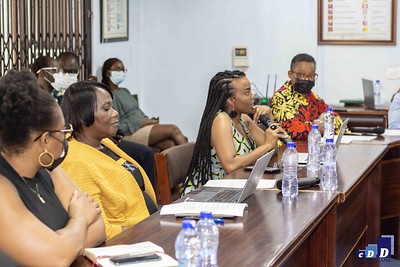Turning Research Findings into Advocacy Tools Key to Influencing Policies on Gender Equality
Professor Nana Akua Anyidoho, Director of the Centre for Social Policy Studies (CSPS) at the University of Ghana, attributed the inability of scholars to be activists to existing prejudices.
- Advertisement -
Women/Feminist Scholars have been encouraged to turn their research into advocacy tools to influence public policy to advance efforts toward achiev ing inclusion and gender equality in Ghana.
Speaking at a roundtable discussion on the theme: “Academia Meets Policy – The Role of Feminist Scholars,” Professor Jarpa Dawuni, a Fulbright Specialist under the U.S. Embassy–administered Fulbright Program and a Democracy and Development (D&D) Fellow at the Ghana Center for Democratic Development (CDD–Ghana), emphasized the urgent need for academia and civ il society organizations
(CSOs) to work collaboratively to expand research into untapped areas within the gender and human rights space to awaken interest and shape public policy.
- Advertisement -
The event brought together gender activists, women/feminist scholars, and media practitioners to explore opportunities and av enues for collaboration to achieve the mutually beneficial goal of gender equality.
- Advertisement -
Specifically, the roundtable discussion was an opportunity for CDD–Ghana to build partnerships with women scholars who can become consultants for future collaborative work in research, policy, and advocacy. It also sought to provide feminist scholars with opportunities and a platform to engage in public scholarship and advocacy through their research.
Professor Nana Akua Anyidoho, Director of the Centre for Social Policy Studies (CSPS) at the University of Ghana, attributed the inability of scholars to be activists to existing prejudices.
“We have different pressures and motivations because as much as feminist researchers would want our research to have an impact and to make real–life differences, we also have the pressures of responding to what our academic environment requires of us,” she said. “I’ve had colleagues who have almost been penalized for the fact that they were activists as well as scholars and researchers. Somehow, there is this
notion that you being an activist compromises your objectivity in some way so there is this prejudice that
we have to deal with.”
- Advertisement -
On her part, Dr. Wunpini Fatimata Mohammed, Assistant Professor at the College of Journalism and Mass Communication, University of Georgia, highlighted the importance of sharing research findings with the media. She noted that although social media is a widely used medium, women/feminist scholars should consider using all forms of media – both traditional and social media – to reach those who may be
disadvantaged due to the digital divide.
Speaking on opportunities for turning research into policy and advocacy tools, Dr. Kojo Asante, Director of Advocacy and Policy Engagement at CDD–Ghana, noted there is a lot of data that have not yet been mined, analyzed, or utilized. He maintained that it is essential for adv ocacy to be backed by research and stressed the importance of making research findings accessible to all.
Ms. Regina Amanfo–Tetteh, Lead for CDD–Ghana’s Human Rights Desk, listed women’s involvement in inter and intra–party politics and their influence on policy decisions; the future value of work for women post–pandemic recovery; sustainability of women’s agenda in the face of dwindling funding for CSOs and the shrinking of civic spaces as some research areas CDD–Ghana, the Centre for Gender Studies and
Advocacy (CEGENSA) at the University of Ghana and the CSPS can collaborate on to inform advocacy.
Dr. Deborah Atoborah, Director for CEGENSA said the Centre’s core mandate is to ensure gender equity features in policy and democratic governance and permeates many aspects of Ghanaian life. She thus pledged their commitment to bridging the gap between academia and civ il society; while broadening the scope of gender research.
“We seem to be experiencing gender fatigue because we have focused our work around certain issues to the neglect of other key issues. When we broaden the scope, the element of fatigue will begin to reduce and we will then have a whole lot of issues to work with,” she said.


- Advertisement -


